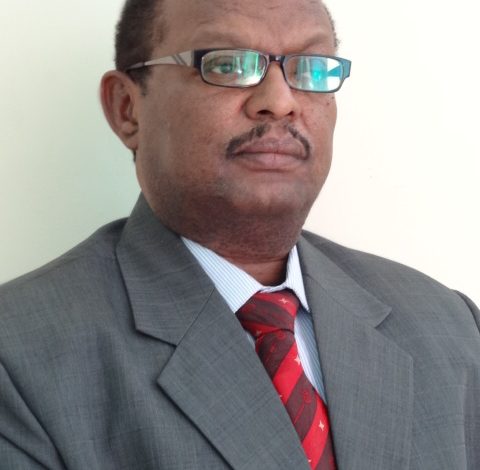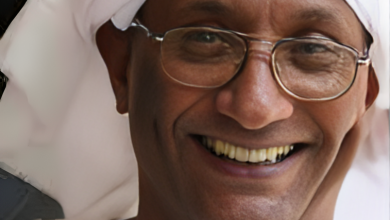One of Inspirational Achievements of his Diamond Career… Mahjoub Mohammed Saleh is Rare Example of National Integrity

Written by: Khaled Al-Tijani Al-Nour
Although Professor Mahjoub Mohammed Salih wrote his reference work on the history of the Sudanese press for half a century 1903-1953, his diamond inspiring path in the paths of “Her Majesty” for nearly three-quarters of a century contributed to drawing prominent landmarks in the country’s history whose impact is not limited to the journalistic field, but rather its impact extends lastingly. In the public sphere, Professor Mahjoub has remained an active presence in the national memory, and he has been known for his many initiatives and contributions in the arenas of media, politics and society at most of the junctures that have continued to pose a challenge to the rise of Sudan since the early years of the quest for independence until the present day.
The presence of Professor Mahjoub as a prominent figure in the public sphere for decades did not obscure his undoubted keenness to remain loyal, sincere, and faithful to his enlightening media message. He was one of the pioneers of journalism and symbols of enlightenment, which was the gateway to his extended giving in various fields of national work. Here the secret of his “diamond journalistic career” is revealed, to which he has remained committed. Throughout its journey, he was interested and did his best to contribute to keeping the flame of journalism burning despite all the political fluctuations and years of prolonged restrictions.
Through personal experience, I was able, as many of my colleagues and male colleagues in the profession were able to see bright aspects of Professor Mahjoub’s personality that formed a source of inspiration for me and for successive generations of male and female journalists. The influence of the professor’s school and his achievements on journalism and journalists was not limited to the venerable Al-Ayyam newspaper, and those who passed through it. With distinction, he entered the paths of the profession through its gate. Rather, his outpouring extended to other newspapers, and those who were distinguished by their intelligence were young journalists, especially his encouragement of women to enter the heart of journalistic work and not remain on the sidelines of the troublesome profession.
Professor Mahjoub was keen on our experience in the newspaper “Al-Sahafi Al-Dawli”, which was published in the late nineties of the last century, and which carries signs and hopes that point an arrow in the efforts to renew the path of Sudanese journalism. He was generous in his encouragement of its first publication, noting the excellence of its approach, following with interest its path, offering advice and taking care of its experience as a participant. A summary of his rich experiences with those in charge of it, supporting its development.
This was not a source of astonishment on our part, for something of its kind is not surprising, and that is the characteristic of those with great souls. Like them, their goodness extends to others without harm or harm, and there is no surprise, for this indicates an inherent nature in the formation of Professor Mahjoub’s personality and his biography, despite his high reputation and great status. As one of the pyramids of Sudanese journalism and the builders of its glory, he is distinguished by a personality of great sophistication, civility, and generosity, guided by humility and politeness. At no point in dealing with him do you feel that you are in front of an important, prominent figure with historical achievements, and you can almost feel his keenness to deal in a spirit of general fellowship and friendliness with everyone. Including the younger generations.
Among the professor’s many achievements in serving the Sudanese press and enlightening public opinion was the perseverance that marked his long career and his determination to adhere to the profession despite all the challenges and difficulties that continued to surround journalism during the long eras of totalitarianism, and this did not stand in the way of him exerting the utmost effort in employing any niche no matter how small, to expand freedoms and enable the press to play its role.
I have always admired his extreme keenness to participate personally, in the late nineties and early 2000s, in the meetings called for by editors-in-chief, most of whom had not yet been born when he was editor-in-chief half a century ago. He did not surround himself with any aura or elegance and participated in these meetings, allowing his deep opinions and valuable experiences are presented with all humility.
Perhaps one of the most important and significant opinions of Professor Mahjoub was contained in the paper prepared by the great writer entitled “Lessons of the Past and Challenges of the Present,” which he presented at a symposium held in Khartoum on November 16, 2003, in celebration of the centenary of the beginning of the journey of Sudanese journalism. It was not a talk based on the past. Rather, he also looked forward to its future and the future of the national situation, and presented the essence of his long experience and rich experiences to the new generations.
He raised urgent questions, the source of which is “a question that kept recurring in my mind: Which is more useful: contemplating the events of the past, or dealing with the crisis of the times?” He continues his reflections, “It is a question that makes determining priorities difficult, as the crises of the present were an embryo in the womb of the past, and this does not It is separated from that, and perhaps history sheds light, or some light, on the present, and examining the past of journalism and its origins may illuminate the way for us as we address its current crisis.”
Then he goes on to add a very important dimension, saying, “Then another fact is no less important, which is that the crisis of the press in any society is part of the crisis of that society. It cannot be addressed in isolation from this. If a society experiences an economic crisis, the press will also experience that crisis. Society has lost freedom and democracy. The press has deteriorated, its foundations have been disturbed, and it has lost its function. If society lacks stability, chaos will prevail in the press.
What luminous words, deep-sighted and far-reaching, for journalism is not just a mirror reflecting society, carrying travels unconsciously. Rather, it is an integral part of its fabric. It interacts with it in its conditions and defenses. If he complains, it responds to him, not by repeating his complaint. Rather, it is obligated by duty and responsibility to play a role. The pioneer who contributes to efforts to emerge from the cycle of despair to open the doors of hope.
There is no surprise in this, as the Sudanese press, as Professor Mahjoub says, “is the oldest institution of public opinion in the country. It preceded clubs and associations, preceded parties and unions, and preceded councils and parliaments. It established national thought, crystallized public opinion, and united the ranks of the national movement.”
The Sudanese press is one of the oldest institutions in Africa and the Arab world. It preceded many countries in its emergence, but they all caught up with it and then surpassed it in appearance and information, in doubt and content, and it remained lagging behind. Since the dawn of independence, and until today, it has not known the meaning of stability, tossed by the hand of fate. A plight for another, as it is either besieged or confiscated, or complains of blackout or nationalization, or faces repression or is threatened by closure. This has an impact on the profession, weakening it, and on those working in it, exhausting them, and cutting a cord that connects generations.”
Professor Mahjoub poses the major questions of fate facing the Sudanese press: How does it grow, when it lacks reassurance and stability? How does it grow, when its hands are tied with restrictions, and its tongue is bridled with orders and laws? How does it advance, when it is like a losing investment, when it is like a repelled profession, and when it is like a besieged and marginalized institution? .
Surprisingly, Professor Mahjoub says, some of what the press suffers from today is what it has been complaining about since its early inception. In a lecture he gave at the Graduate Club in Omdurman in the year 1937, Ahmed Youssef Hashem summarized what the press was suffering from at that time, and he sums it up in “ The journalist’s suffering in not obtaining facts from their official sources, the officials’ lack of criticism, the exposure of newspapers to administrative penalties that amount to closure, and the narrowing of the margin of freedom.” Thus, what today’s journalists complain about is not very different from what those early pioneers complained about.
Professor Mahjoub comments on this paradox with a wise saying: “History truly casts its shadow over the present.”
Professor Mahjoub believes that there are two lessons from the legacy of the Sudanese press: the first is the ability to benefit from the newcomer, adapt him to serve national goals, and storm out of the arena despite all the sanctions, then expand the margin of freedom through practice with a willingness to sacrifice and bear the consequences.
The successful journalist is not paralyzed by the siege imposed on the freedom of a journalist, but rather searches for paths, paths, and struggle in order to expand the margin of freedom available to him with determination, persistence, and sacrifice. He stresses, saying, “They are two prominent characteristics in the legacy of Sudanese journalism, and we still live for them and by them.”
He added that the other legacy was the openness of our journalism to the new and benefiting from all sources of professional knowledge, whether the professionalism came to us from abroad, or we immigrated in search of it, as it is the lost product of a journalist who believes in his profession.
Professor Mahjoub believes that the Sudanese press has been destined, since its inception, to bear the responsibility of “awareness” and the responsibility of “mobilization” at the same time, which has created a special dynamic for it. Among all the institutions of society concerned with expressing public opinion, the press was the first to be born and has continued to stand like a sword. Alone in the field for a long time.
He argues that the crisis of the Sudanese press is due to the changing conditions of time, because as one era has passed and another era has come, it must start again with new capabilities and new journalists, and work under new conditions, and all of this has hindered the communication of generations and the transfer of experiences, and he suggested a solution to this: At the top of today’s duties should be collective work to move to a permanent state for the press that protects it from the evil of these fluctuations and achieves stability for Sudan.
He stressed that this will only be done within the framework of a national project that establishes lasting peace, complete stability, and a rational and sustainable democratic transformation. Journalism, in his conviction, will not serve its interest as a profession except within the framework of a new national project, and therefore it is its duty to adopt that project, preach it, defend it, and promote it.
It is as if there are words spoken today to address the challenges of the pivotal historical stage that the glorious December Revolution paved the way for, but in reality it is a vision that Professor Mahjoub Mohammed preached two decades ago, anticipating what we are living in today, and that is nothing but the product of wisdom that he possesses from a wealth of long experience. And diverse and multiple experiences, a wealth of knowledge, and great awareness of the benefits of getting out of the protracted national crisis.
From the experience of aspects of Professor Mahjoub’s biography in public life outside the scope of the journalistic profession, one realizes how rare a person he was in his interaction and approach to public affairs in a country in which the prolonged political conflict and the dominance of military authoritarianism in its various manifestations led to complications and the prevalence of a state of severe polarization in the absence of an agreed-upon national project. The professor was distinguished by his national integrity, which he rose above narrow biases through his wide-minded openness to any initiative or movement in the arena that he saw as something that would contribute fairly to resolving the sustainable national crisis and take steps on the path to peace, democracy and development.
For all of this, and these are fleeting fragments, the tip of the iceberg in a truly inspiring biography, and some of what the position allowed, we are facing a great cognitive effort in which it is not enough to celebrate a passing eulogy, but rather we must seek to benefit from it in enhancing knowledge and awareness and promoting patriotic sentiment.



